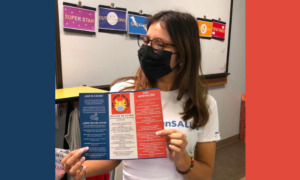
More than 70 AmeriCorps VISTAs for ServiceWorks were officially sworn in by national service advocate General (Ret.) Stanley McChrystal. While many of them are younger than 24 themselves, they’ll spend the next year helping opportunity youth build the skills, resources and networks needed to succeed in college and careers.
To kick off its third year, ServiceWorks – a youth development program from AmeriCorps, the Citi Foundation and Points of Light – recently convened 72 new AmeriCorps VISTAs in New York City.
They gathered to hear from national service leaders about the importance of empowering young people with tools for success, to be officially sworn in as AmeriCorps members – and to lead hundreds of volunteers at one of Manhattan’s largest events honoring the 9/11 National Day of Service. Though too young to remember that day very well, if at all, their participation offered a sense of the spirit of national community that permeated the country 15 years ago.
“In a weird sense, it gave me a new positive perspective,” reflected Kate Morlock, a 22-year-old VISTA in St. Louis. “Obviously it was a solemn day, and 9/11 had a tremendous impact on not only New York City but globally as well. For me it was incredible to see families of the 9/11 victims turn an act of pure hatred and terror into something so inspirational and positive. I had a chance to meet so many people of all different backgrounds coming out to make their community better, on a day that has such a horrific history.”
After dispersing to the 14 ServiceWorks host cities to begin their year of working to empower underserved young people with the skills, resources and networks needed to succeed in college and career, several VISTAs offered reflections on that powerful experience — and the challenges and solutions they see for opportunity youth.
Lisa Cohn, 22, ServiceWorks Site: United Way, Greater St. Louis
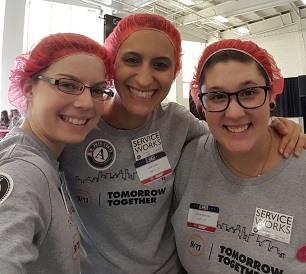
Lisa Cohn (center) is joined by two of her fellow United Way of Greater St. Louis VISTAs at a 9/11 Day service project in Lower Manhattan.
Why did you choose ServiceWorks?
I am upset by disparities in access to education and employment and desire to strive for equity in these areas. I appreciate that the ServiceWorks curriculum addresses the softs skills of professional development — an area that is often overlooked in secondary and postsecondary education but valued by employers. I also love that ServiceWorks does not stop at churning out competent employees but desires to create leaders. I am excited to be part of a program that has the potential to transform communities by empowering youth to lead through service.
How do you envision helping youth in your community?
I am excited to help youth utilize the positive traits they already possess to obtain education and employment and to become community leaders. In my experience working with opportunity youth, I have found that many are impressively resilient and creative in their approach to problem-solving, because they have faced more obstacles than others their age.
[Related: Service Programs Try to Launch Opportunity Youth into Careers, College]
They have the core characteristics necessary for career success and service-minded leadership, but often have not been taught important soft skills. I look forward to providing that training through ServiceWorks and seeing the Service Scholars channel their abilities and insights into helping their communities.
What do you think stands in the way of success for opportunity youth?
Hunger, poor school quality, the inaccessibility of healthcare, nearby violence, lack of transportation, and an absence of older role models — these barriers force opportunity youth to work significantly harder than more privileged youth to have even a slim chance at success.
Often the psychological barriers prove as daunting as the social and economic ones, resulting in high levels of stress because they have to take on more responsibility than any teenager should have to. All of these obstacles add up and often result in opportunity youth feeling trapped and hopeless, seeing no possibility of future success.
If you could wave a magic wand and make one thing instantly better, what would it be and why?
Choosing only one area is difficult, but I would use my magic wand to ensure every young person has a mentor. Although having a supportive role model does not make every problem go away, being loved and believed in goes a long way toward providing the necessary strength to keep fighting difficult circumstances. In addition to moral support, mentors can provide practical help with homework, job applications and transportation.
Ideally these mentors would have overcome similar obstacles and therefore be able to offer insight and encouragement based on personal experience. I would never be where I am today without an army of caring, successful, older women guiding and encouraging me. The impact of mentorship on my personal journey has led me to believe that everyone needs and deserves that kind of support network.
Talk about a time when you saw a fellow young person in need.
My freshman year of college, I stumbled upon a sign-up sheet to volunteer at the St. Louis Juvenile Detention Center. When I added my name, I did not know anything about the juvenile justice system or even mass incarceration, but simply wanted to get involved in an extracurricular.
My experience there ended up changing my life, leading me to continue to volunteer for the next four years and switch career tracks. The teenagers I met were fighting social, economic and familial barriers I had never imagined, yet they still cared for their loved ones and for each other, and were determined to make positive changes in their lives.
My admiration for these teenagers grew throughout my time as a volunteer, but so did my anger at the system that let them fall through the cracks. As a result of my experience at the juvenile detention center, I decided to dedicate my life to working with people who have been incarcerated or have a high risk of being arrested.
This fall at ServiceWorks St. Louis, we are facilitating a cohort at the St. Louis Juvenile Detention Center. It has meant a lot to me to be able to keep working with the youth who inspired me to dedicate my life to service. Although the obstacles they face are daunting, I am honored to have the opportunity to support these youth as they chip away at them.
Adam Davis, 19, ServiceWorks Site: Education is Freedom, Dallas, Texas
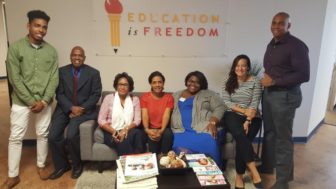
Adam Davis, far left, ServiceWorks VISTA at Education is Freedom in Dallas, Texas
Why did you choose ServiceWorks?
It not only had something close to my major but it had a service aspect that I like. I feel like if we are blessed, we can’t just keep it for ourselves. We have to go out and give some of it to the world.
How do you envision helping youth in your community?
I envision helping youth by mentoring them with their problems, tutoring them and motivating them to want to do more in life.
What do you think stands in the way of success for opportunity youth?
They may be too comfortable in the position they are in. Maybe they haven’t seen anything more in life, so they don’t know what to aspire to be.
If you could wave a magic wand and make one thing instantly better, what would it be and why?
I would make their motivation levels higher. I believe if you put all your effort and energy into something, then nine times out of 10 it will happen. And even if it doesn’t, you will at least be closer to your goal.
Talk about a time when you saw a fellow young person in need.
I saw a kid last year struggling. He was doing all he could do to graduate high school and couldn’t pay for his cap and gown. Nobody in his family had ever graduated from high school. So I was walking in the lunchroom one day and saw him sitting there when all of the seniors were getting their graduation gear. He had this look in his eye as if his life was ending. So, I stopped what I was doing and asked him what the problem was. At first he was hesitant to tell me, but then he got up and told me to follow him and we went to the hall and discussed it. He told me his family was having money troubles and he probably was not going to get to walk across the stage.
It shook me. I had never been in a position where my family needed money, so it was hard to imagine not being able to have money for basic or important things. So I called my mom and asked her was it okay if I took money out of my account and paid for his stuff. She said yes. Fast forward to graduation: I saw the kid with his gown on after we all walked the stage and his mother came up and hugged me and thanked me. I felt like I had changed someone’s life and made an everlasting memory for him and his family.
Alexus Harris, 20, ServiceWorks Site: HandsOn Jacksonville
Why did you choose ServiceWorks?
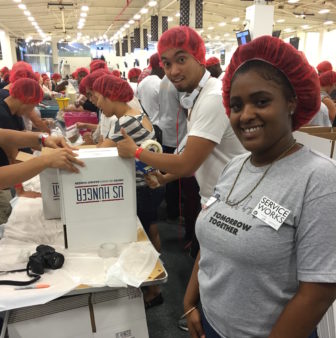
Alexus Harris, 20, says she’s “definitely” an opportunity youth herself. She’ll spend the next year with young people at HandsOn Jacksonville.
ServiceWorks, unlike many other programs, is really hands-on, getting more into real life experiences.
How do you envision helping youth in your community?
By inspiring them to be self-sufficient, and giving them confidence to know they have the ability to do whatever they put their mind to.
What do you think stands in the way of success for opportunity youth?
I see more followers than leaders, and followers can become a statistic.
If you could wave a magic wand and make one thing instantly better, what would it be and why?
Guide young people on the principles of money management.
Talk about a time when you saw a fellow young person in need.
My friend was coming out to her family about being part of the LGBT community and she was kicked out [of her home]. I had this little hiding spot I go to with peaceful aims. I brought her food. She had shelter, a shower and TV. It made me feel horrible because family is supposed to be everything and who you can run to. But something so small can mean something so big for someone else.
Kate Morlock, 22, ServiceWorks Site: United Way of Greater St Louis
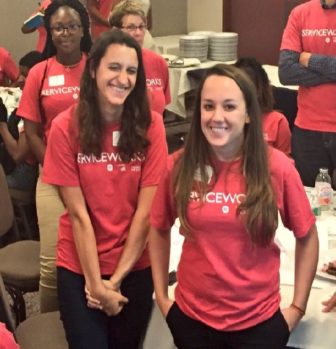
Kate Morlock (at right) with fellow United Way of Greater St. Louis VISTA Lisa Cohn
Why did you choose ServiceWorks?
Inequality in education has been a major issue in the St. Louis, Missouri, community, especially considering the city’s history of segregation and suburbanization. I learned about ServiceWorks interning at my host site, and felt like this would be an excellent opportunity to help my community with an issue I care deeply about.
How do you envision helping youth in your community?
Our youth are passionate, dedicated, and ambitious — but often don’t have as many on-ramps to success. I want to empower youth in my community so they can achieve their education and career goals. I want to show young people they are capable of making a difference in their community, and they are capable of being a leader and change-maker.
What do you think stands in the way of success for opportunity youth?
With the students we have worked with, it can be a variety of factors, and we must always recognize that each person has their own journey, and with that comes unique challenges to success. Some of the themes we see are not having basic needs met, lack of knowledge on the college admissions (especially financial aid) process, and a lack of support system outside of school.
If you could wave a magic wand and make one thing instantly better, what would it be and why?
I would want all youth to have their basic needs met, meaning food, water, clothing and shelter. I believe that this is a basic human right. To see kids who are every bit deserving of leading a healthy, successful life, not have a safe home is incredibly heartbreaking.
Talk about a time when you saw a fellow young person in need.
A friend of mine recently went through tough time adjusting in a new city. I provided emotional support to her when she needed some extra help and it felt good to see her get to a happier place was really important to me.
Abby Urias, 22 – ServiceWorks Site: Youth Policy Institute, Los Angeles
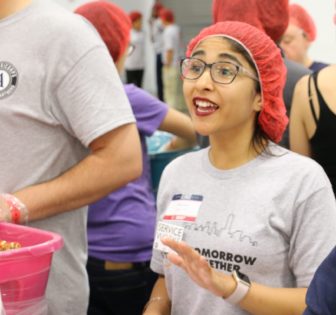
Abby Urias, AmeriCorp member at the Youth Policy Institute in Los Angeles
Why did you choose ServiceWorks?
I wanted to empower my local community in a long-lasting way. With a program like ServiceWorks, you are giving youth the tools and skills for themselves to highlight their own strengths. We’re not here to change or save youth, but rather give them the chance to show off their own skills and use them in a group setting to do greater good. ServiceWorks helps youth polish skills they already have.
How do you envision helping youth in your community?
I envision helping the youth by empowering them and showing them how awesome they truly are. Youth from the San Fernando Valley, California, area are fighters – hardworking and inspiring. But sometimes they lack the confidence and don’t see the amazing things they’re capable of.
Another way to help young people is making sure they know they have the support they need. If they need anything, they have their case managers, mentors, teachers and us to help them in any way possible.
What do you think stands in the way of success for opportunity youth?
Resources! Many of these young people have a good base to be successful. What they are lacking are the resources, support and the opportunity. Many youth don’t know they have community centers or that you can get scholarships for college.
If you could wave a magic wand and make one thing instantly better for, what would it be and why?
These youth have the drive to succeed. They are just not given the chance to do so. Either they have family to take care of, or they can’t study because of work. If just given the chance, they would have a great GPA or career. They tend to have more barriers to deal with than other youth. I feel if they had more opportunities— like low-cost school, free counseling, free childcare or even flexible job hours — they would be more successful in achieving their goals.
As someone too young to remember 9/11, what did it mean to you to take part in such the 9/11 service project?
It was very special to me because it rewrites the day as not a day of grief, but rather a day of community. To see New York City come together to pack more than 500,000 meals is so inspiring. And to be in New York that day, seeing people come from all over the country to honor and remember the people who lost their lives was also very inspiring.
Talk about a time when you saw a fellow young person in need.
The starting point was when I was placed into a non-honors class in high school. My high school was starting to become one of the best schools in the Los Angeles Valley at the time. That meant its resources were distributed unequally. I was in mostly honors classes, which meant I also got a lot of time with the college counselor and was able to take college classes.
Yet when I got into the non-honors class and talked to my peers, I realized they had no idea of how college works. So I let them know what it was, why they should go, and how we have a college center. I ended up getting them to apply to community college! Seeing my peers go through that experience is why I am doing the job I am doing today.




